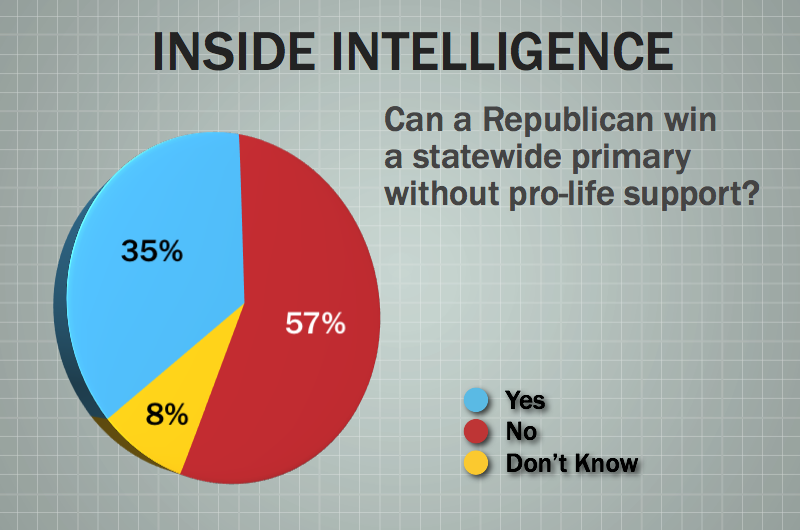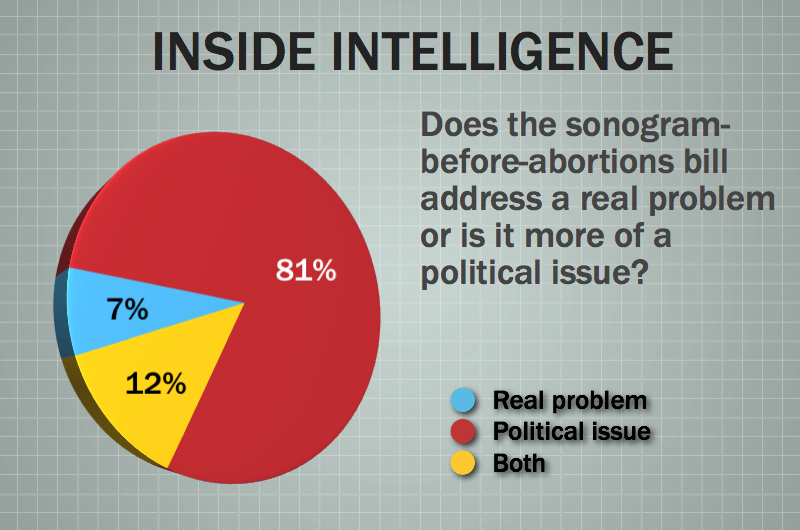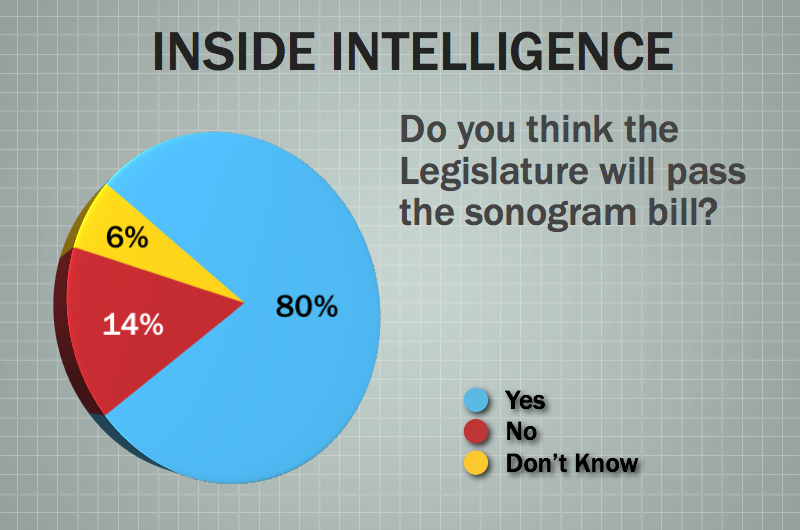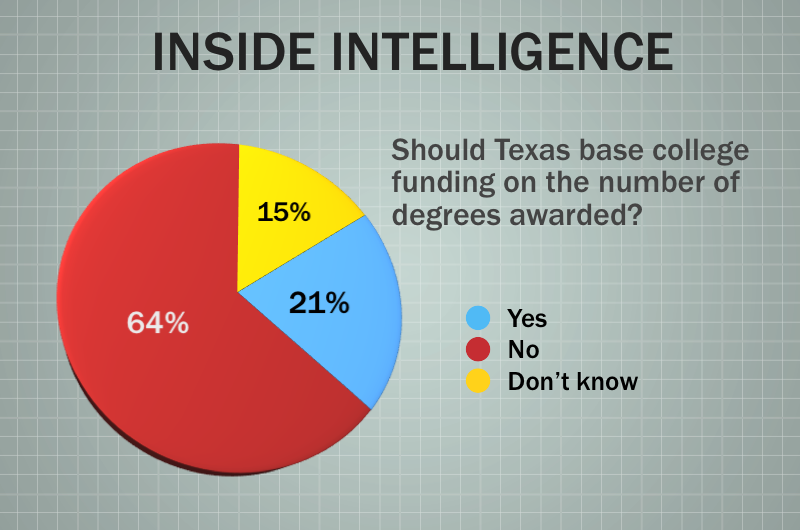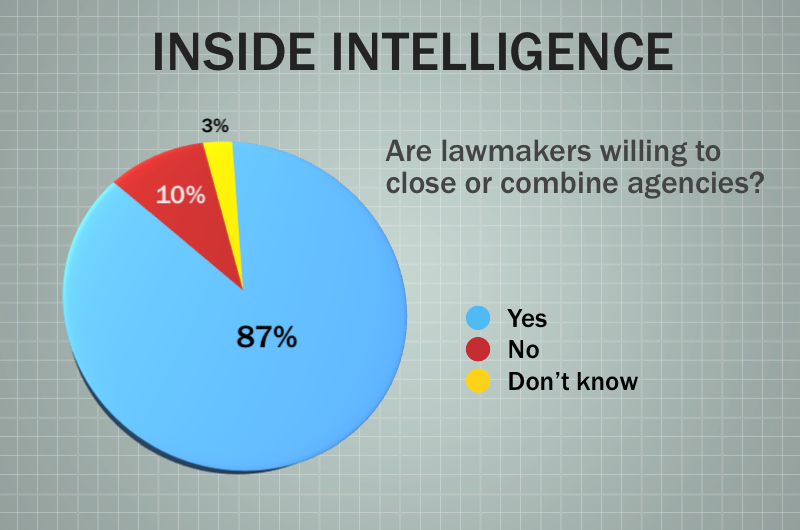The keepers of numbers over in the LBJ Building, north of the Capitol, have confirmed to lawmakers what they warned them about in 2006: The legislation that cut local school property taxes and revised the state's corporate franchise tax didn't balance, to the tune of $10 billion a biennium.
Wherever you want to point your finger, them's the numbers, and they'll keep recurring, chief revenue estimator John Heleman told the Senate Finance Committee, every time the budgeteers gather.
And if you're in the finger-pointing mode, you'll want to refer back to the fiscal notes that were in place when the votes were taken back in 2006. It lacked credibility at the time, since then-Comptroller Carole Keeton Strayhorn was running for governor and everyone was accusing her of juicing the numbers to make Gov. Rick Perry look bad. They passed their bills and Perry won reelection and Strayhorn went home. The numbers are still here. The Legislative Budget Board (which wasn't running for governor) scored the bills in that school finance package and found that they'd run annual deficits of between $5 billion and $6 billion once everything was up and running. As it turns out, they were pretty close to the mark.
If it's a recurring hole — a structural deficit in the Capitol vernacular — it's not the sort of thing you can fix with the Rainy Day Fund. But it's not the only reason for the state's budget troubles, or maybe even the main one. There was a hole in the economy. Sales dropped, and the sales taxes upon which the state depends fell, too. That, on paper, is why they have an economic stabilization fund (that's the Rainy Day Fund's official name) — to offset crummy economic cycles.
The conversation has turned now to using Rainy Day money for the current deficit — the $4.3 billion gap between current spending and current income — and then to argue about whether any of it should be used to balance the two-year budget that starts in September. A reminder: That $4.3 billion number will change; Comptroller Susan Combs didn't include savings from budget cuts ordered and implemented in the last five months.
Inside Intelligence: Social Issues
This week, we asked our insiders about the sonogram bill — another of the issues on Gov. Rick Perry's list of emergency items open to immediate action from the Legislature. And about related social issues. For instance, most of our insiders don't think a Republican can win a high-profile Republican primary without pro-life forces behind them. The sonogram bill would require doctors, within an hour before performing an abortion, to do a sonogram and play the audio so the mother can hear the heartbeat and to put up video where the mother could see the fetus.
The insiders think that's more a political issue than something that addresses a real problem — 81 percent to 7 percent, while the rest think it's a combination of those things. Will it pass? The insiders have little doubt, with 80 percent predicting passage.
Our open-ended question was " Given the makeup of the Texas Legislature, what social legislation will pass this session that was blocked before, and how will that play into the next elections?" The full set of responses is available in our Files section, but here's a sampling:
• "Hopefully these knuckleheads will take care of issues of critical importance first (budget, redistricting, business friendly policy) before tackling any social monsters from the Cathie Adams School of Nonsense."
• "Most any social legislation which was previously proposed but did not pass is likely to pass this Session. How that will play in 2012 is hard to say."
• "What social legislation won't pass is more like it. Republicans could make being a Democrat a first-degree felony, and it would probably sail through both chambers and get rubber stamped by the Governor without any political ramifications in the next election."
• "Don't know, but whatever does or does not pass will not be a major issue in the next elections. Taxes and government services will be the dominant theme."
• "Whatever the Senate doesn't block."
• "Given the makeup of this legislature, I'm not sure I understand why they're not outlawing abortions altogether. A direct challenge to SCOTUS would be right up their alley."
• "Vote ID. Passing it will actually help protect the moderates in the primaries"
• "Until we see a few votes it is hard to tell how the huge freshman class shakes out, but with a 101 R's in the House they can probably pass everything that 12 D's in the Senate don't block."
• "Voter ID and Immigration will both pass and create a generation of motivated Latinos who will vote Democratic."
• "Hopefully, dealing with the budget and redistricting will keep them too busy to interfere with our personal lives."
• "Nothing will pass. A lot will be debated in committees."
They Can Agree on One Thing
Think you can get 6,500 school leaders together in a room reach any agreements? Maybe: Superintendents and board members from districts across the state who gathered this week in Austin say they'll present a united front and tough words for lawmakers this session.
Superintendents and trustees (here for the Texas Association of School Administrators' and Texas Association of School Boards convention) are asking lawmakers to use the Rainy Day Fund and search for new revenue through fees instead making $10 billion in proposed cuts (quick back-of-the-envelope: there were 4,824,778 students in Texas public schools last year, so $10 billion in cuts from the biennial budget would be a little more than $1,000 per student, per year.) They also want lawmakers to fix the current school finance system, which Northside superintendent and former TASA president John Folks calls one of the "most inequitable and inadequate" funding mechanisms in the country.
In remarks that could portend a new school-finance lawsuit, school leaders warn that the Texas Constitution mandates that the state provide a "free and adequate" education to all children, saying that "there's no clause that says 'if funds are available.'"
Texas Education Commissioner Robert Scott told the school leaders that though the 82nd Legislature would be "the most difficult legislative session facing public education in my lifetime," he believed that "there are ways to make the budget work."
"I don't stand here in fear. I stand here looking at a problem," he said, adding, "Now is not the time to lose our heads. Now is not the time to point fingers and scream and yell. Now is the time to solve the problem."
Scott suggests deferring payments into the next biennium, tapping the Rainy Day Fund, easing regulation of school districts and changing the state's school financing formulas as ways to help reduce the gap between funding per student in rich and poor districts. His first priority, he says, will be to protect the Foundation School Program, which finances the state's basic educational curriculum. Then he will ask for money to pay for end-of-course exam materials and discretionary grants like teacher incentives and early childhood education.
"I believe the budget situation will improve by the end of the session," he told the group. "I just don't know how much."
Scott also addressed the possibility of postponing the roll-out of the state's new student assessment program, the STAAR test — an idea that drew cheers from the audience. While he said the TEA is on track to implement the new standards, he said that will be "the debate of this Legislature."
"If you are 15 billion in the hole, what are you going to do with student expectations?" Scott said, adding, "If there is no money, will you raise standards?"
Professor Branch
House Higher Education Chairman Dan Branch, R-Dallas, played professor this week, delivering a lecture to students at the University of Texas as part of the Texas Politics speaker series. He noted that after much hand-wringing over universities bearing the brunt of the 5 percent statewide cuts in 2010, their cuts in the House and Senate base budgets pale in comparison to those of public education and health and human services. "Public ed may be coming after us," he said.
His main priorities for the session include improving outcomes, reducing students' time to completion of college and increasing efficiency. The first can be done, he said, by tweaking eligibility standards for financial aid programs. For the second, he recommends required degree plans. And for the third, boosting digital learning.
The proposed budgets cut $431.2 million from financial aid — essentially maintaining funding for current recipients but offering little for new students who will soon be entering college. Branch said he is hopeful that some new revenue will be found to alleviate that situation.
He added that the public isn't willing right now to support increases in state revenue, referring to two polls — one from the major newspapers and another from the conservative Texas Public Policy Foundation — that showed strong support for trimming higher education.
"Maybe we just haven't done a good job selling," he said, "or maybe they're right." Either way, he said, higher education needs to do better marketing. "This is a job-creating machine," said Branch, offering the pitch.
On a hopeful note, he indicated that hardship could lead to innovation. "But for this pressure," he said, "I don't think we'd come up with the ideas that we're going to come up with."
Clear and Present Danger
A new report on the Fort Hood shooting that killed several servicemen and women could leave Texas lawmakers clamoring for more oversight of military installations to prevent a future massacre. On Nov. 5, 2009, Maj. Nidal Hasan allegedly went on a shooting rampage and killed 13 people on the base and injured several dozen more. A report released this week by Senate Homeland Security and Governmental Affairs Committee Chairman Joe Lieberman, I-Conn., and ranking member Susan Collins, R-Maine, indicates the government could have prevented the shooting. The findings have U.S. Sen. John Cornyn, R-Texas, calling on Congress to act and not allow soldiers' safety "to play second fiddle to political correctness."
"This report makes clear that the FBI and the DoD [Department of Defense] between them, had enough pieces of the puzzle to prevent Maj. Nidal Hasan from committing this atrocity, but failed to do so. It also confirms that military leaders failed to confront the threat of homegrown Islamic terrorism within their own ranks," Cornyn, a member of the Senate Armed Services Committee, said in a statement.
Sen. Kay Bailey Hutchison added: "The report reveals what many of us feared — there were clear and troubling warning signs that were ignored. We must learn from the violent attack at Fort Hood so we can prevent future tragedies."
According to the report summary, though officials within the Department of Defense and the FBI didn't have detailed information about the time and place of the attack, they "collectively had sufficient information to have detected Hasan's radicalization to violent Islamist extremism but failed both to understand and to act on it."
The Week in the Rearview Mirror
The hotly contested race for House District 48 continues nearly three months after polls closed. After a recount showed him trailing Rep. Donna Howard by just 12 votes, Republican Dan Neil appealed to the full House, summoning lawyers, subpoenas and testimony from voters about their residency and how they voted. Officials recounted 265 mail-in ballots and, in good news for Howard, left the tally unchanged. When proceedings conclude, Rep. Will Hartnett, R-Dallas, will make a recommendation to a special House committee, which will then make its own recommendation to the full House, which has the final word on who gets the seat.
After an unusual cold front brought ice and snow to large portions of Texas, the Electric Reliability Council of Texas — ERCOT — announced that the demand for power was overwhelming the state's electric grid. Texans woke up to rolling blackouts after ERCOT instructed utilities to institute temporary outages to its customer base of about 22 million. ERCOT also asked customers to reduce usage as much as they could to avoid temporary interruption of electrical power, which lasted between 10 and 45 minutes for most of those affected.
With Houston caught up in lawsuits surrounding a public vote in November to remove the city's red-light cameras, a new study showed a drop in fatalities in areas in which the cameras are used. The Insurance Institute for Highway Safety conducted a study of 99 cities, 14 of which used red-light cameras. It showed a 24 percent reduction in fatal accidents when comparing those cities that had installed the cameras between 1996 and 2004.
Gov. Rick Perry got some progress on one of the five emergency items on his to-do list. Though voter ID still awaits House approval, the Senate gave its approval to the measure. Republicans have the votes to get it passed in the House, but more debate is expected over expanding the types of ID that will be accepted. And they can't do anything in the lower chamber until they've got committees named.
The State Board of Education will keep Gail Lowe as its chairwoman, pending Senate confirmation. Gov. Perry reappointed the conservative Republican to serve as the head of the committee overseeing Texas' public school system, a role she first took on when previous chairman Don McLeroy, R-Bryan, was unable to garner the required two-thirds support in the Senate in 2009. Lowe characterizes herself as sharing the same socially conservative credentials as McLeroy.
Gaping budget shortfall aside, the state trust fund that helps Texas communities defray the costs of hosting major sporting events has granted $31.2 million for the Super Bowl. Dallas, Arlington, Fort Worth and Irving are expected to contribute $4.3 million, with the state kicking in the balance of $26.9 million. They're betting the event will generate enough additional tax revenue to offset the upfront cost, and the Major Events Trust Fund has been expanded to include smaller communities and other events, like Formula One racing. Proponents tout the grants as an effective lure for major events to be scheduled in Texas cities.
BP announced plans to cut its refining capacity and focus on exploration and has put its refinery in Texas City on the block. Since the disastrous explosion there in 2005, the company has poured over $1 billion into equipment upgrades and has spent more than double that to settle claims related to the accident. It's also found itself on the hook for millions in federal fines. Given the massive size of the plant, there isn't a large pool of buyers who can afford the multibillion-dollar price tag, but there has been interest in the facility in the past, and given the limited refining capacity in the U.S., a buyer could be found before the target date of the end of 2012.
Several Texas senators met behind closed doors — where else? — to discuss whether the enhanced security at the Capitol is sufficient. Metal detectors and heightened state trooper patrols are already in place, with surveillance cameras to come, but some senators still feel uneasy, particularly because citizens with concealed handgun permits are able to pass freely through the metal detectors. The senators were briefed on how to handle a situation where a gun is pulled and were given more details on security measures they may have been unaware of, like an alert service for cell phones.
Senate Committees
No surprises here, really: Little turnover in the Senate, little turnover in the committees. Redistricting has nine Republicans and six Democrats. House committees could, possibly, perhaps, maybe, be out within the week. House Speaker Joe Straus told reporters they wouldn't be this week, and separately, Appropriations Chairman (presumptive) Jim Pitts said in a speech that he'll start budget hearings on Thursday of next week. You have to have a committee to do that, right? In the meantime, Lt. Gov. David Dewhurst's list came out right after last week's issue:
Administration: Eltife, Chair; Uresti, Vice-Chair; Ogden; Shapiro; Wentworth; Whitmire; Zaffirini
Agriculture & Rural Affairs: Estes, Chair; Uresti, Vice-Chair; Hegar; Hinojosa; Jackson
Business & Commerce: Carona, Chair; Harris, Vice-Chair; Eltife; Estes; Jackson; Lucio; Van de Putte; Watson; Whitmire
Criminal Justice: Whitmire, Chair; Huffman, Vice-Chair; Carona; Ellis; Hegar; Hinojosa; Patrick
Economic Development: Jackson, Chair; Fraser, Vice-Chair; Birdwell; Eltife; Harris; Watson; Zaffirini
Education: Shapiro, Chair; Patrick, Vice-Chair; Carona; Davis; Gallegos; Ogden; Seliger; Van de Putte; West
Finance: Ogden, Chair; Hinojosa, Vice-Chair; Deuell; Duncan; Eltife; Estes; Lucio; Nelson; Patrick; Seliger; Shapiro; West; Whitmire; Williams; Zaffirini
Government Organization: Ellis, Chair; Hegar, Vice-Chair; Birdwell; Lucio; Nelson; Ogden; Whitmire
Health & Human Services: Nelson, Chair; Deuell, Vice-Chair; Huffman; Nichols; Patrick; Rodriguez; Uresti; West; Zaffirini
Higher Education: Zaffirini, Chair; Birdwell, Vice-Chair; Duncan; Huffman; Watson; Wentworth; West
Intergovernmental Relations: West, Chair; Nichols, Vice-Chair; Gallegos; Patrick; Wentworth/ Subcommittee On Flooding & Evacuations: Gallegos, Chair; Nichols; Patrick
International Relations & Trade: Lucio, Chair; Davis, Vice-Chair; Fraser; Gallegos; Rodriguez; Seliger; Williams
Jurisprudence: Harris, Chair; Rodriguez, Vice-Chair; Carona; Duncan; Gallegos; Huffman; Uresti
Natural Resources: Fraser, Chair; Estes, Vice-Chair; Deuell; Duncan; Eltife; Hegar; Hinojosa; Jackson; Nichols; Seliger; Uresti
Nominations: Deuell, Chair; Hegar, Vice-Chair; Fraser; Nelson; Nichols; Rodriguez; Watson
Select Committee On Redistricting: Seliger, Chair; Gallegos, Vice-Chair; Carona; Eltife; Estes; Fraser; Hinojosa; Huffman; Lucio; Patrick; Uresti; Wentworth; West; Williams; Zaffirini
State Affairs: Duncan, Chair; Deuell, Vice-Chair; Ellis; Fraser; Huffman; Jackson; Lucio; Van de Putte; Williams
Transportation & Homeland Security: Williams, Chair; Watson, Vice-Chair; Davis; Ellis; Harris; Hinojosa; Nichols; Shapiro; Wentworth
Veterans Affairs & Military Installations: Van de Putte, Chair; Wentworth, Vice-Chair; Birdwell; Davis; Estes; Rodriguez
Sam Kinch Jr., 1940-2010
Sam Kinch Jr., the founding editor of Texas Weekly and a former political and government correspondent for The Dallas Morning News, died at home this week. He was 70, and had been battling pancreatic cancer, emphysema and congestive heart disease.
Kinch started the newsletter in 1984 with two friends, George Phenix and John Rogers. He sold his share in 1998 and retired to write, travel and enjoy his family.
 He was a terrific reporter and mentor to other journalists, irreverent, smart as hell, a great lover of dirty jokes, full of history, an incurable reader, a Presbyterian elder and a surprisingly soft touch for people who needed some help.
He was a terrific reporter and mentor to other journalists, irreverent, smart as hell, a great lover of dirty jokes, full of history, an incurable reader, a Presbyterian elder and a surprisingly soft touch for people who needed some help.
He wrote books, including Texas Under a Cloud, with Ben Proctor, about the Sharpstown stock scandal that rocked the Capitol and resulted in the biggest turnover in legislators in modern history, and Too Much is Not Enough, with Anne Marie Kilday, a book on campaign finance in Texas.
Kinch was a University of Texas grad, with a bachelors degree in history and a master's degree in journalism, and served as editor of The Daily Texan. Survivors include his wife Lilas, three adult children, six grandchildren, and a bevy of friends.
Political People and Their Moves
U.S. Senate candidate Roger Williams will have some big names on his finance committee: He signed up Drayton McLane, Don Powell and Dee Kelly Jr. for the effort. McLane is owner of the Houston Astros and the McLane Group; Powell is an Amarillo banker and former chairman of the FDIC, and Kelly is a Fort Worth lawyer.
Nina Perales is now the director of litigation for MALDEF, where she's been an attorney working on civil rights, redistricting and other issues. David Hinojosa is the organization's new southwest regional counsel.
Nelson Salinas joins the Texas Association of Business as a lobbyist on education issues. He'd been with former Rep. Yvonne Gonzalez Toureilles, D-Alice.
Kris Heckmann and Justin Keener opened a lobby and public affairs shop they're calling Granite Public Affairs. Heckmann worked for Gov. Rick Perry; Keener was most recently with the Texas Public Policy Foundation.
U.S. Rep. Ruben Hinojosa, D-Mercedes, declared personal bankruptcy, according to the Associated Press. He told the wire service the economy sunk H&H Meat Products Co. and his personal finances along with it.
Texas House Democrats elected Rep. Jessica Farrar, D-Houston as their leader and Rep. Marc Veasey, D-Fort Worth as caucus chair. Reps. Joe Pickett, D-El Paso, and Hubert Vo, D-Houston, are treasurer and chair pro tempore, respectively.
Gov. Rick Perry named Major Gen. John F. Nichols of Spring adjutant general of Texas, pending Senate confirmation. The adjutant general is commander of the Texas Military Forces and subordinate only to the governor in matters pertaining to the Texas Army National Guard, Texas Air National Guard and Texas State Guard. Nichols is currently assistant adjutant general for air and commander of the Texas Air National Guard at Camp Mabry.
The governor reappointed Debbie Unruh of Austin as Texas Youth Commission independent ombudsman. Unruh is former captain and jail administrator for the Randall County Sherriff's Office, a past law enforcement instructor at Amarillo College and former director of the Amarillo Bail Bond Board.
Perry also appointed three members to Stephen F. Austin State University's board of regents. Brigettee Henderson of Lufkin is an independent consulting interior designer and executive assistant at Carnes and Co. Auctioneers. Ken Schaefer of Brownsville is owner of Schaefer Stevedoring Inc. Ralph C. Todd of Carthage is a senior account manager at Baker Hughes Inc. Their appointments are subject to Senate confirmation.
Perry reappointed Ronald Congleton of Austin to the Texas Workforce Commission. Congleton is retired president of Teamsters Local 745 in Dallas.
The governor reappointed Rod Bordelon Jr. as commissioner of Workers' Compensation at the Texas Department of Insurance.
And Perry reappointed Betty Reinbeck of Sealy to the Texas Facilities Commission; she's executive director of the Tomball Economic Development Corp and former major of Sealy.
Quotes of the Week
Catherine Frazier, a spokeswoman for Gov. Rick Perry, on the governor's opposition to requiring police officers to check immigration status in Texas: "The governor continues to oppose demanding peace officers inquire, just as he opposes measures that prevent them from asking."
Department of Homeland Security Secretary Janet Napolitano on why some lawmakers continue to bash the federal government's border policy, to an audience at the University of Texas at El Paso: "It is inaccurate to state, as too many have, that the border is overrun with violence and out of control. This statement — often made only to score political points — is just plain wrong."
The Texas Democratic Party's Anthony Gutierrez, on the new Hispanic Republican Conference, to The Associated Press: "We need leaders with the courage to fight for us, not a Republican club pandering to us while its members stand right alongside the very people attacking our community."
Sen. Juan Hinojosa, D-McAllen, on metal detectors at the Capitol, quoted in the Austin American-Statesman: "If someone wants to shoot a senator or a lawmaker or someone else, they can do it after we leave the building at night. All this security is more of an inconvenience to the general public than anything, in my opinion."
Rep. Aaron Peña, R-Edinburg, to The Associated Press on Tyler Republican Rep. Leo Berman's proposed legislation that would deny illegal immigrants the right to sue legal residents of the state of Texas: "It allows people to treat other people like animals, and it invites chaos."
Sen. John Whitmire, D-Houston, interrupting a presentation detailing proposed budget cuts to state health services during a Finance Committee hearing: "Mr. Chairman, I enjoyed the math, but that's not putting a face and an impact on the decisions that we have to make."
State Rep. John Zerwas, R-Richmond, in the Houston Chronicle: "We saved these monies to be used on a 'rainy day.' Most of us would agree this is one of those rainy days. I'm all for really starting off with an austere sort of stark budget, but I think to leave any substantial amount of money in that rainy-day fund is a disservice to the citizens."
State Sen. Florence Shapiro, R-Plano, in the Houston Chronicle: "One of those burdens that we have placed on our school districts is that they cannot decrease your salary. They can't have furlough days. It's not allowed in the law. The only option is to fire. We need to give them the ability to lower teacher salaries."
State Rep. Rob Eissler, R-The Woodlands, on public schools and the tight budget: "Instead of just adding on, we need to start replacing things that don't work with things that do work."
U.S. Speaker John Boehner, answering a question about his personal habits on Fox News Sunday: "It's a legal product. I choose to smoke. Leave me alone."
Contributors: Julian Aguilar, Reeve Hamilton, Ceryta Lockett, David Muto and Morgan Smith
Guest Columnists:
What I'd Do About the Budget Shortfall
We invited three advocates to share their preferences and ideas for what the state's lawmakers should do in the face of rising costs and tight revenues. And now, Bill Hammond of the Texas Association of Business, Talmadge Heflin of the Texas Public Policy Foundation, and Eva DeLuna Castro of the Center for Public Policy Priorities.
There's something to be said for leaders in the Texas Legislature sticking to their guns and releasing a state budget that keeps spending within existing revenues.
To my friends in the House and Senate, I say: We must continue to fight to ensure that we implement cost-saving reforms that reflect Texas' commitment to economic growth. But our current budget shortfall isn't a time to be penny-wise-and-pound-foolish.
The state will have $72.2 billion available for general-purpose spending during the 2012-13 biennium, leaving a $15 billion gap from the current general revenue spending of $87 billion. How do we close this gap? It will take grit and courage to address the shortfall without raising taxes, creating new fees or increasing existing ones. Difficult? Yes. Doable? Absolutely.
First, let's hold the line on general revenue spending at its current level of $87 billion for the biennium. Next, while the sky isn't falling, it sure is raining. So let's have the courage to tap the Rainy Day Fund for $6 billion, a prudent and appropriate action.
To control health care costs, one simple fix is to remove a loophole that allows the Rio Grande Valley to effectively opt-out of Medicaid managed care. This single change — expanding Medicaid managed care statewide — would result in $1.2 billion in savings.
We need efficiencies in government, including education where smart budgeting and reforms will offer a significant return on our investment by way of an educated, skilled workforce.
We've worked hard to raise high standards for students in pre-kindergarten through high school. To that end, we must use the Available School Fund for its constitutionally intended purpose—student textbooks and instructional materials, including technology. Budget writers should prioritize $550 million of the fund for digital and print materials for pre-kindergarten, English as a second language, writing and science,--all of which are due to classrooms this fall.
We could also use more of the $1.9 billion Available School Fund to restore programs eliminated in the base budget that have had proven success in improving education in Texas. Among these strategic investments are a $270.9 million technology allotment; $223.3 million for pre-kindergarten programs that provide a solid foundation for our youngest students; $385.1 million for incentive pay for our school's most outstanding teachers; $51 million for proven secondary level strategies that will improve post-secondary readiness and graduation rates; and $20.3 million for the virtual school network.
There's also a case to be made for fully funding effective, efficient state programs in public and higher education that are critical to our State's long-term competitiveness and prosperity. I'd argue for the TEXAS Grants program to be kept at current spending levels, while making reforms to ensure greater productivity. We must graduate more students with degrees or post-secondary credentials, and a priority-based TEXAS Grants program that remains fully funded will certainly help us get there. Higher education funding should be kept level too, but let's demand better performance by requiring 10 percent of higher education funding to be based on completion rates.
Plenty more opportunities exists to make strategic cuts, accounting tweaks and smart updates to state law to get us to the $87 billion budget target.
For one, let's go ahead and delay the date of payments by the State by one day into the next fiscal year, a useful tactic used when Texas last faced a significant budget crunch in 2003. This simple action could save the State $3 billion to $4 billion alone.
While we don't have to expand the gambling footprint, we can and should pass legislation to allow slot machines at existing Texas horse and dog racetracks and Native American Indian reservations. These machines would generate as much as $850 million in direct state tax revenue during the current biennium and nearly $1 billion per year at full implementation.
We can pass legislation that requires probation with mandatory treatment for first-time, low-level drug possession offenders with no prior violent, sex, property or drug delivery crimes, allowing for an estimated $500 million savings by 2012.
As for the remaining $2.5 billion, it's reasonable to consider some of the thoughtful recommendations laid out in recent days by organizations like Texas Higher Education Coordinating Board, the Texas Public Policy Foundation and Texas Conservative Coalition Research Institute.
What I have set forth could best be summed up as a rational proposal for budgeting. Let's make strategic cuts and responsible investments that will ensure our state's continued prosperity.
Bill Hammond is President and CEO of the Texas Association of Business. He served four terms in the Texas House of Representatives.
Austin insiders say that additional revenue is needed to close the state's projected multi-billion dollar budget shortfall. Without the extra income, they claim, lawmakers risk the state's future fiscal health and prosperity. But is that really the case? Is more money the only viable solution?
Of course not. Just as anyone managing a household budget knows, when a family's expenses grow beyond its income, the solution is not to instantly drain your savings and demand a raise from your boss. The proper response is to cut back on household expenses — particularly if your family's spending habits resemble anything close to the state's.
According to the Legislative Budget Board, state government spending increased by nearly 300 percent between fiscal years 1990 and 2010, or 139 percent after adjusting for inflation. During the same period, Texas' population grew by only 49 percent. Considering this kind of spending trajectory, it is little wonder that Texas' finances have gotten out of whack. Maintaining this level of expenditure growth is not sustainable, and lawmakers must now make reasonable adjustments on the spending side of the state's ledger.
Now the hard part: If the most sensible solution to the state's fiscal woes is reducing spending, which areas of the budget should the Legislature prune?
In short, there should be no "sacred cows" this session: Every expenditure must be on the table. But we should focus particular attention on getting government out of doing things that individuals or the private sector can take care of themselves, such as promoting tourism, history and the arts, or determining how much consumers should pay for electricity, telephone service or insurance.
Likewise, there are a lot of things we can do without for a biennium (or two) while we try to get our fiscal house back in order. We can postpone the purchase of new parks, delay renovations of historical properties and get by without some recent and expensive environmental and health care spending.
We also need to think big. Health care and education spending dominate the budget, and if we are going to successfully tackle the shortfall, we need to look at ways to stretch our dollars further in these areas.
For example, lawmakers should consider such policy options as expanding Medicaid managed care, creating a health savings account option for state employees, cutting back all optional health programs to federally required levels, reducing university formula funding across-the-board and giving school districts the tools and the prodding to curb administrative bloat in K-12 education.
Finally, the Legislature should consider significantly paring back, if not altogether eliminating, state economic incentives and subsidies. If our low taxes, limited and predictable regulations, right to work laws and civil justice system aren't enough to make Texas attractive to some businesses, that would suggest they're the type of rent-seeking transients Texas can do without.
In conjunction with these budget reduction options, lawmakers should also take care not to tap the state's rainy day fund or resort to accounting gimmickry.
First, it is important to realize that one-time measures and spending sources should not be used to support ongoing obligations. If your family's budget is consistently exceeding its bounds, no reasonable person would advocate that you raid your savings account to enable day-to-day spending. This only prolongs the root problem of excessive spending.
Perhaps more importantly though, this session does not appear to be the state's only difficult budgeting cycle. According to research we published last month, "Final Notice: Medicaid Crisis," Medicaid costs before ObamaCare will double every 10 years through the next three decades. ObamaCare adds 3.1 million people to Texas' Medicaid rolls by 2014, and Texas will need an additional $10 billion in the next budget to meet those costs. The state will need to preserve as much of its financial flexibility for as long as possible to help avoid future fiscal crises.
Holding the line on government spending is never easy; it is far more satisfying to give than it is to take. But in today's economic climate, the reality is that we can no longer afford the level of government spending we have had in the past. Spending must be brought in line with income, not the other way around.
Talmadge Heflin is Director of the Center for Fiscal Policy at the Texas Public Policy Foundation, a non-profit, free-market research institute based in Austin. He served 11 terms in the Texas House of Representatives and chaired the House Appropriations Committee in 2003, when the state had a $10 billion budget shortfall.
Budget hearings have been underway for only a few days, but it's already clear that $72 billion in General Revenue won't be nearly enough to meet the needs of Texas. Instead of cutting down to the revenue estimate, the 82nd Legislature must take a balanced approach that uses our reserves and adds revenue. And we have to start by casting aside wishful thinking; we are writing the 2012-13 budget, with higher costs and increased enrollment in education and health care services — not some past budget. (In fact, the 2006-07 budget is the most recent one that could be covered with $72 billion in General Revenue. That's also the last budget before $14 billion in local property tax reductions were added to the state appropriations act; more on this later.)
Future needs — what's called "current services" levels — require at least $99 billion in General Revenue. With only $72 billion available, the revenue shortfall endangering state services is $27 billion. That $99 billion does not include any "wish list" items. Agencies requested almost $107 billion in General Revenue to expand or improve state services, but only current services costs for education, health care, and prisons are included the $27 billion shortfall calculation.
So what's the right way to close a 27 percent gap in one of the lowest-spending, lowest-taxing states in the nation? What options do we have that won't send the Texas economy into a tailspin?
Use the Rainy Day Fund: all $9.4 billion. It's officially called the Economic Stabilization Fund for a reason. State budget cuts could easily lead to layoffs of more than 100,000 school district employees, costing another 140,000 private sector jobs. Can the Texas economy afford to lose a quarter of a million jobs? Legislators overwhelmingly agreed that tapping the fund was the right thing to do in 2005 (HB 10, Pitts), 2003 (HB 7, Heflin) and earlier sessions when it was raining nowhere near as hard as it is now.
Smoke and mirrors: $5 billion. Delaying July-August 2013 payments to school districts could push $3.5 billion in costs into fiscal 2014 and buy much-needed time to see if state revenue recovers faster than is currently forecast. Yes, this could cause a few school districts some cash flow problems, but not as much as the almost $10 billion cut to the Foundation School Program proposed in the House budget draft. Where possible, postpone one month of payments to Medicaid and other providers, along with other large payments to non-GR accounts and pension systems, or speed up collections of General Revenue so they happen in 2013. Anything that buys time and can be undone in the future is preferable to cuts today. (Note: This does not include cutting low-income utility assistance and other services funded by dedicated General Revenue to help certify the budget; those go in the category of "cuts today").
New revenue options: $12.5 billion. Enforce existing tax laws ($500 million). Enact a hospital quality assurance fee ($350 million) to help match federal Medicaid dollars. Eliminate or reduce outdated tax breaks — for example, the high-cost-natural-gas exemption ($2.3 billion a biennium) and the sales tax timely filer/prepayment discounts ($150 million). Enact a Healthy Texas Tax Bill that boosts the cigarette tax by $1 a pack ($1.5 billion biennially), taxes sugar-loaded drinks ($2.5 billion biennially) and raises taxes on beer ($100 million) and other alcoholic beverages. Expand the sales tax to cover certain business and professional services ($5 billion).
What should we do beyond the session? Part of the revenue shortfall is due to the Great Recession. The recession will be temporary, so the revenue losses it caused can be replaced with the Rainy Day Fund or "smoke and mirrors." But the Legislature must also plug the hole caused by 2006's school property tax cuts. The structural deficit caused by the failure of franchise tax changes to generate anywhere near the local tax revenue lost by school districts has created a $10 billion biennial hole in the state budget. Permanent structural changes (such as closing the high-cost gas tax loophole or expanding the sales tax base) will be needed to fix this structural deficit. If we don't take a balanced approach now, our longer-term problems will be that much harder to solve.
Eva DeLuna Castro has been a budget analyst at the Center for Public Policy Priorities since 1998. She worked as a researcher and writer at the Comptroller's office for six years.
Texas Weekly: Volume 28, Issue 5, 7 February 2011. Ross Ramsey, Editor. Copyright 2011 by The Texas Tribune. All Rights Reserved. Reproduction in whole or in part without written permission from the publisher is prohibited. One-year online subscription: $250. For information about your subscription, call (512) 716-8600 or email biz@texasweekly.com. For news, email ramsey@texasweekly.com, or call (512) 716-8611.


